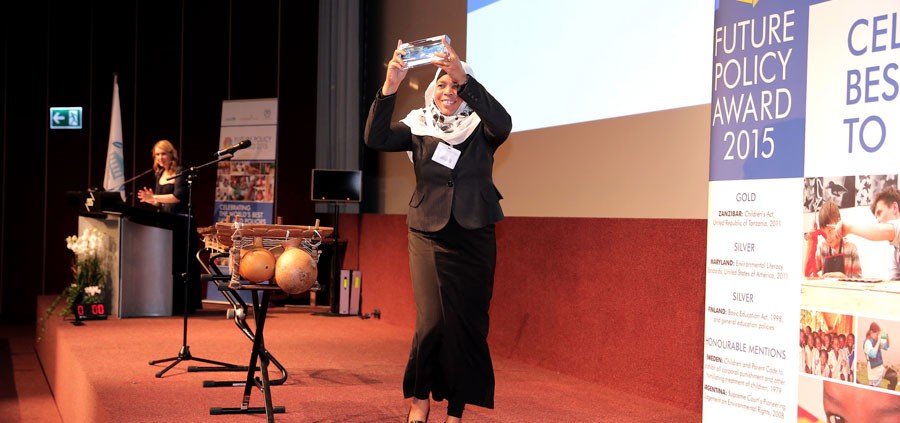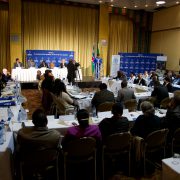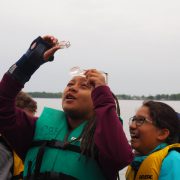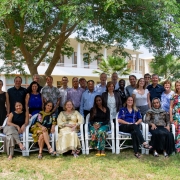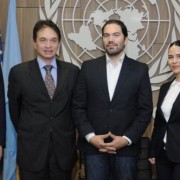Pioneering child rights policy from Zanzibar wins distinguished award
Hamburg/Geneva/New York – 20 October 2015: Zanzibar’s pioneering child rights law is the winner of the 2015 Future Policy Award on securing children’s rights, beating 29 other nominated policies to the prize. The Award will be presented at a ceremony in Geneva today by the World Future Council, the Inter-Parliamentary Union (IPU) and UNICEF during the 133rd IPU Assembly.
The “Children’s Act” was awarded for its effective response to child abuse and violence and for its promotion and protection of child rights that have led to a marked societal change in attitudes towards children in Zanzibar. Alongside a revamped child protection system, many schools are now piloting alternatives to the previously widespread use of corporal punishment and thousands of children have been assisted in returning to school from harmful work. A pioneering feature was a child consultation process which provided young people with an understanding of the law and their rights, leading to the establishment of over 200 Children’s Councils.
On learning about the Gold prize, Asha Abdullah, Principal Secretary of the Zanzibar Ministry of Empowerment, Social, Welfare, Youth, Women and Children said: “This is a great honour. The Award will not only raise global awareness of our model of child rights legislation, but also enhance our commitment to its implementation.”
Jakob von Uexkull, Founder and Chair of the World Future Council, said: “This prize celebrates policies that help us to do the right thing by creating the right rules. Children are among the most vulnerable group facing a host of the world’s emerging challenges. We need more laws that support a just world and protect the rights of future generations.”
Silver Awards were granted to two other policies. The state of Maryland in the US was recognized for becoming the first to require students to be environmentally literate as a high school graduation requirement. Other states, such as Kentucky and Utah have since developed education plans based on Maryland’s “Environmental Literacy Standards”.
Finland’s ‘Basic Education Act’, adopted in 1998 won the second Silver Award for guaranteeing children’s equal access to high-quality education and training, irrespective of ethnic origin, age, wealth, language or location. Finland’s holistic and trust based education system produces excellent results, both in terms of child well-being and international test scores.
IPU Secretary General Martin Chungong said: Parliaments can lead the response against child abuse and violence by ensuring international commitments on children’s rights are adhered to nationally through laws that are effectively implemented and monitored. The winning policies can only inspire parliaments and parliamentarians everywhere on concrete action to take.”
Honourable Mentions were conferred on Sweden’s Children and Parent Code which prohibits all corporal punishment and other humiliating treatment of children, and Argentina’s Supreme Court’s Judgement on Environmental Rights.
UNICEF Executive Director Anthony Lake commended the recognition bestowed by the awards: “Children’s rights are brought to life not through pronouncements, but through practical action. Parliamentarians are among UNICEF’s most important partners in driving that action and the results it can achieve in children’s lives. We applaud the World Future Council for spurring more parliamentarians to leverage their powers on behalf of the world’s most disadvantaged and vulnerable children.”
The Future Policy Award is the only award which honours policies rather than people on an international level. The World Future Council will now work to globally raise awareness of the winning model policies and assist policy-makers to develop and implement similar initiatives.
More information on the award and the winning policies can be found in our brochure, which can be downloaded in English, French and Spanish.
Press Pictures from the Award Ceremony can be downloaded from 9 p.m. CET October 20 from the WFC’s Flickr or from IPU’s Flickr page
Follow the awards on Twitter with #2015fpa
Future Policy Award
The Future Policy Award is designed to alert policymakers and the public to the importance of best practice in lawmaking and highlight outstanding examples of regulatory vision. The Award draws attention to existing sustainable policies and demonstrates that when political will is asserted, positive change can happen. Celebrating visionary policies raises public awareness, encourages rapid learning and speeds up policy action towards just, sustainable and peaceful societies. For more information, see here.
Previous Future Policy Award Topics:
2014: Ending Violence Against Women and Girls
2013: Disarmament
2012: Oceans and Coasts
2011: Forests
2010: Biodiversity
2009: Food Security
Media Contacts
World Future Council
Alexandra Schiffmann
Media and Communications Manager
+49 4030 70 914-19 (Hamburg, Germany)
alexandra.schiffmann@worldfuturecouncil.org
IPU
Jemini Pandya
Director of Communications
Tel: + 41 22 919 4158 (Geneva, Switzerland)
jep@ipu.org
UNICEF
David Ponet
Parliamentary Specialist
Tel: +1 212 326 7660 (New York City, USA)
dponet@unicef.org
The World Future Council brings the interests of future generations to the centre of policy-making. Its up to 50 eminent members from around the globe have already successfully promoted change. The Council addresses challenges to our common future and provides decision makers with effective policy solutions. In close cooperation with civil society actors, parliamentarians, governments, business and international organizations the World Future Council identifies “best policies” around the globe. The World Future Council is registered as a charitable foundation in Hamburg, Germany. As the global organization of national parliaments, the Inter-Parliamentary Union (IPU) works to establish democracy, peace and cooperation among peoples by uniting members to drive positive change. Its focus on gender equality and in particular, women’s political participation, addresses a key component of democracy. Since 2008, IPU has also been working with parliaments to end violence against women through advocacy and awareness-raising activities and the introduction and implementation of legislation to tackle the issue. Find out more at: http://www.ipu.org UNICEF promotes the rights and wellbeing of every child, in everything we do. Together with our partners, we work in 190 countries and territories to translate that commitment into practical action, focusing special effort on reaching the most vulnerable and excluded children, to the benefit of all children, everywhere. For more information about UNICEF and its work visit: www.unicef.orgThe World Future Council
Inter-Parliamentary Union (IPU)
UNICEF
Follow UNICEF on Twitter and Facebook

